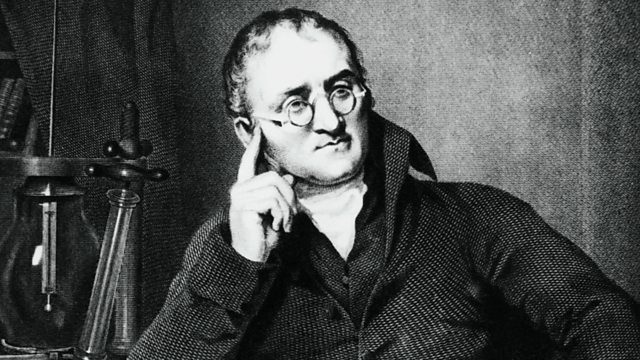John Dalton
Melvyn Bragg and guests discuss scientist John Dalton, who pioneered the development of atomic theory and carried out research into meteorology and colour blindness.
The scientist John Dalton was born in North England in 1766. Although he came from a relatively poor Quaker family, he managed to become one of the most celebrated scientists of his age. Through his work, he helped to establish Manchester as a place where not only products were made but ideas were born. His reputation during his lifetime was so high that unusually a statue was erected to him before he died. Among his interests were meteorology, gasses and colour blindness. However, he is most remembered today for his pioneering thinking in the field of atomic theory.
With:
Jim Bennett
Former Director of the Museum of the History of Science at the University of Oxford and Keeper Emeritus at the Science Museum
Aileen Fyfe
Reader in British History at the University of St Andrews
James Sumner
Lecturer in the History of Technology at the Centre for the History of Science, Technology and Medicine at the University of Manchester
Producer: Victoria Brignell.
Last on
More episodes
Previous
Next
LINKS AND FURTHER READING
��
READING LIST:
William H. Brock, The Fontana History of Chemistry (Fontana Press, 2008)
Geoffrey Cantor, Quakers, Jews, and Science: Religious Responses to Modernity and the Sciences in Britain, 1650-1900 (Oxford University Press, 2005)
Jan Golinski, Science as Public Culture: Chemistry and Enlightenment in Britain, 1760-1820 (Cambridge University Press, 1992)
Frank Greenaway, John Dalton and the Atom (Heinemann, 1966)
Richard Holmes, The Age of Wonder: How the Romantic Generation Discovered the Beauty and Terror of Science (HarperPress, 2009)
Alan Kidd and Terry Wyke (eds.), Manchester: Making the Modern City (Liverpool University Press, 2016), especially ‘History of science, technology and medicine’ by James Sumner
Diana Leitch and Alfred Williamson, The Dalton Tradition (John Rylands University Library of Manchester, 1991)
Elizabeth C. Patterson, John Dalton and the Atomic Theory: The Biography of a Natural Philosopher (Anchor, 1970)
Albert L. Smyth, John Dalton, 1766-1844: A Bibliography of Works By and About Him (Ashgate, 1997)
Arnold Thackray, John Dalton: Critical Assessments of His Life and Science (Harvard University Press, 1972)
Jenny Uglow, Lunar Men: Five Friends Whose Curiosity Changed the World (Faber and Faber, 2002)
Credits
| Role | Contributor |
|---|---|
| Presenter | Melvyn Bragg |
| Producer | Victoria Brignell |
Broadcasts
- Thu 27 Oct 2016 09:00���˿��� Radio 4
- Thu 27 Oct 2016 21:30���˿��� Radio 4
Featured in...
![]()
18th Century—In Our Time
Browse the 18th Century era within the In Our Time archive.
![]()
Science—In Our Time
Scientific principles, theory, and the role of key figures in the advancement of science.
![]()
History—In Our Time
Historical themes, events and key individuals from Akhenaten to Xenophon.
In Our Time podcasts
Download programmes from the huge In Our Time archive.
The In Our Time Listeners' Top 10
If you’re new to In Our Time, this is a good place to start.
Arts and Ideas podcast
Download the best of Radio 3's Free Thinking programme.
Podcast
-
![]()
In Our Time
Melvyn Bragg and guests discuss the ideas, people and events that have shaped our world.



